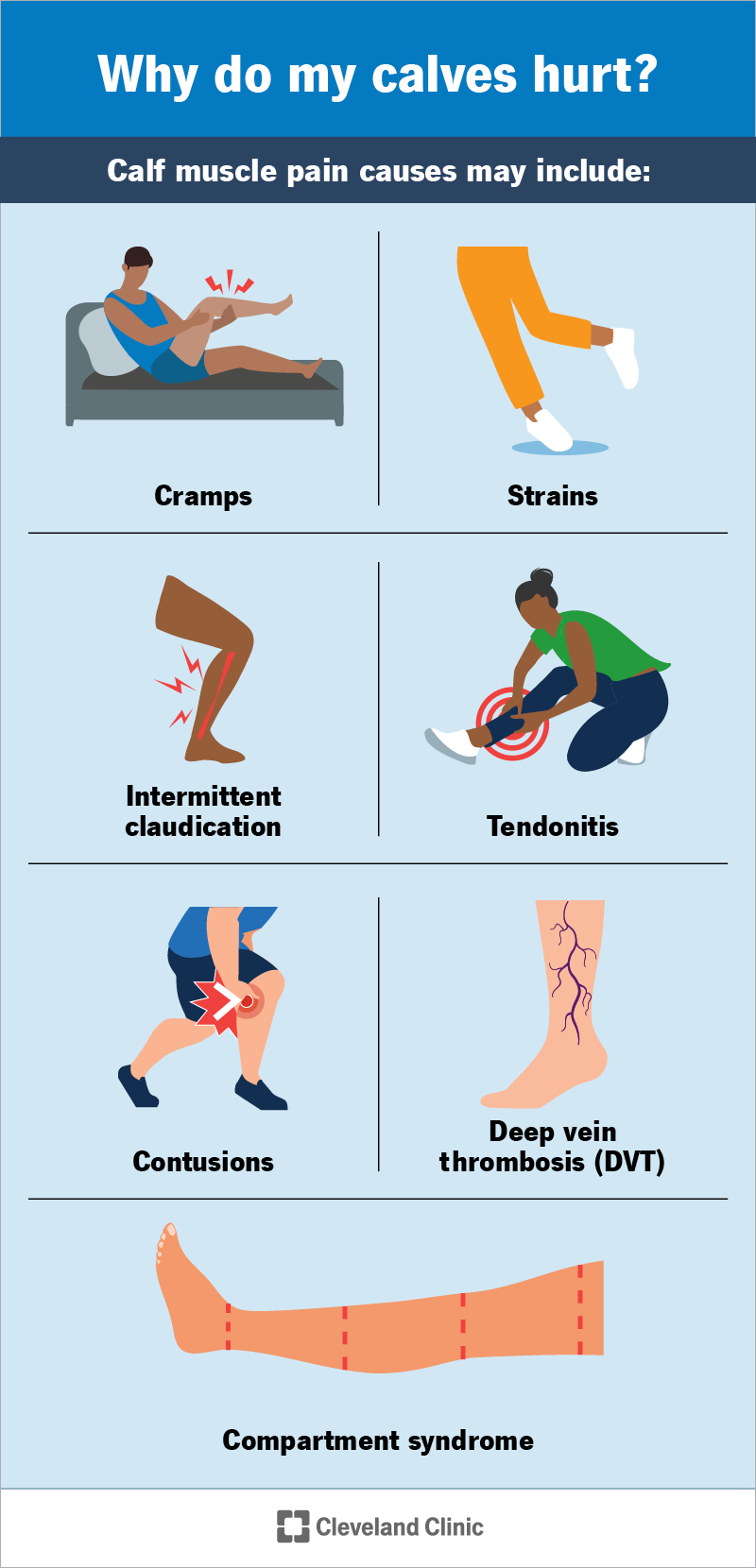Calf muscle pain has many possible causes, including leg cramps, strains and contusions. But severe or ongoing pain in your calves can be a sign that there’s a more serious problem going on. If your pain is mild, you can usually treat it at home. But if you have swelling or sudden pain, see your healthcare provider for immediate treatment.
Advertisement
Cleveland Clinic is a non-profit academic medical center. Advertising on our site helps support our mission. We do not endorse non-Cleveland Clinic products or services. Policy

Image content: This image is available to view online.
View image online (https://my.clevelandclinic.org/-/scassets/images/org/health/articles/calf-muscle-pain-infographic)
Calf muscle pain is a dull ache or sharp pain in the back of your lower leg, behind your shinbone (tibia). Calf pain can feel a little different for everyone. If you get lower leg pain when you’ve been doing something physical like walking or running, the cause is generally muscular. But if the pain in your calf comes on suddenly without a clear cause, it could be a serious health issue, like a problem with your blood vessels.
Advertisement
Cleveland Clinic is a non-profit academic medical center. Advertising on our site helps support our mission. We do not endorse non-Cleveland Clinic products or services. Policy
You can typically treat mild calf muscle pain at home with rest, ice and other simple measures. But if you have skin discoloration, swelling, or sudden or severe pain in your calf muscles, you should see your healthcare provider right away. You may have a health condition that requires urgent medical attention.
Calf pain causes may include:
Advertisement
Anyone can get pain in their calf muscles. It’s more common in athletes and people who participate in a lot of physical activity and put excess stress on their calf muscles. People over age 65 are also at a higher risk of lower leg pain due to muscle weakness, certain health conditions or if they’ve been inactive.
Other factors that can make sore calves more likely include:
You can usually treat mild calf muscle pain at home using the RICE method:
If you have sore calves from a muscle cramp or feel a painful knot in your calf muscle, it may help to gently stretch your calf.
Your healthcare provider may recommend additional treatments depending on the cause of your lower leg pain, including:
You should contact your healthcare provider if you have:
Calf muscle pain is a common complaint and isn’t usually a cause for alarm. But sometimes, pain in your calf is a sign of a more serious condition, like problems with the blood vessels in your leg. Seek help if the pain developed without activity or persists even with rest. This could be a sign of a more severe condition that a healthcare provider needs to evaluate.
Advertisement

Sign up for our Health Essentials emails for expert guidance on nutrition, fitness, sleep, skin care and more.
Learn more about the Health Library and our editorial process.
Cleveland Clinic’s health articles are based on evidence-backed information and review by medical professionals to ensure accuracy, reliability and up-to-date clinical standards.
Cleveland Clinic’s health articles are based on evidence-backed information and review by medical professionals to ensure accuracy, reliability and up-to-date clinical standards.
From sudden injuries to chronic conditions, Cleveland Clinic’s orthopaedic providers can guide you through testing, treatment and beyond.
